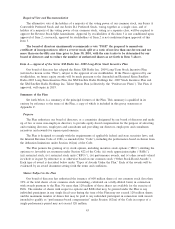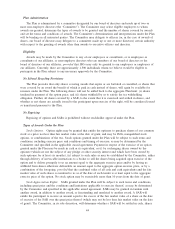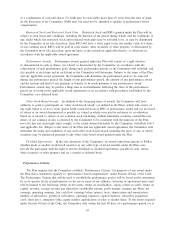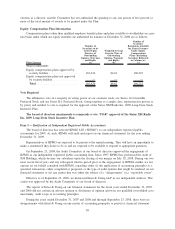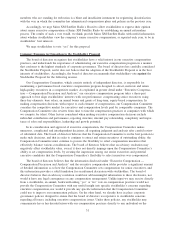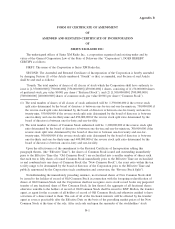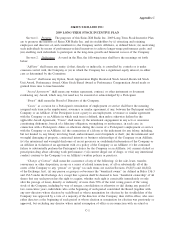XM Radio 2008 Annual Report Download - page 163
Download and view the complete annual report
Please find page 163 of the 2008 XM Radio annual report below. You can navigate through the pages in the report by either clicking on the pages listed below, or by using the keyword search tool below to find specific information within the annual report.
members who are standing for reelection is a blunt and insufficient instrument for registering dissatisfaction
with the way in which the committee has administered compensation plans and policies in the previous year.
Accordingly, we urge Sirius XM Satellite Radio’s Board to allow stockholders to express their opinion
about senior executive compensation at Sirius XM Satellite Radio by establishing an annual referendum
process. The results of such a vote would, we think, provide Sirius XM Satellite Radio with useful information
about whether stockholders view the company’s senior executive compensation, as reported each year, to be in
stockholders’ best interests.
We urge stockholders to vote “yes” for this proposal.
Company Response in Opposition to the Stockholder Proposal
The board of directors recognizes that stockholders have a valid interest in our executive compensation
practices, and understands the importance of administering our executive compensation program in a manner
that conforms to the highest standards of corporate governance. The board of directors has carefully considered
the Stockholder Proposal, and it does not believe that the adoption of the Stockholder Proposal is in the best
interests of stockholders. Accordingly, the board of directors recommends that stockholders vote against the
Stockholder Proposal for the following reasons.
Our Compensation Committee, which consists entirely of independent directors, is responsible for
maintaining a performance-based executive compensation program designed to attract, motivate and retain
high-quality executives in a competitive market. As explained in greater detail under “Executive Compensa-
tion — Compensation Discussion and Analysis,” our executive compensation program takes a three-part
approach to best align stockholders’ interests with our performance, compensating senior executives using
three key elements: base salary, an annual bonus and grants of long-term, equity-based compensation. In
making compensation decisions with respect to each element of compensation, our Compensation Committee
considers the competitive market for executives and compensation levels paid by comparable companies. The
Compensation Committee also reviews from time to time the compensation practices at companies with which
we compete for talent. Other factors considered when making executive compensation decisions include
individual contribution and performance, reporting structure, internal pay relationship, complexity and impor-
tance of roles and responsibilities, leadership and growth potential.
In its consideration and approval of executive compensation, the Compensation Committee makes
numerous, complicated and interdependent decisions, all requiring judgment and analysis after careful review
of substantial data. The board of directors believes that the Compensation Committee is in the best position to
make such decisions, and that in order to continue to attract and retain executives of outstanding ability, the
Compensation Committee must continue to possess the flexibility to select compensation incentives that
effectively balance various considerations. The board of directors believes that an advisory resolution may
negatively affect stockholder value, even if it does not directly impinge upon the Compensation Committee’s
ability to set compensation levels, by creating the impression among our senior executives and potential
executive candidates that the Compensation Committee’s flexibility to select incentives was compromised.
The board of directors believes that the information disclosed under “Executive Compensation —
Compensation Discussion and Analysis” and the executive compensation tables provides a significant amount
of detailed information as to how the Compensation Committee sets compensation for senior executives, and
this information provides a solid foundation for an informed discussion with stockholders. The board of
directors believes that an advisory resolution would not add meaningful information to these disclosures, nor
would it have any legal consequence on any compensation arrangement. Unlike input we may receive directly
from a stockholder, an annual, backward-looking “yes” or “no” vote on compensation practices would not
provide the Compensation Committee with any useful insight into specific stockholder’s concerns regarding
executive compensation, nor would it provide any specific information that the Compensation Committee
could use to improve our remuneration policies. On the other hand, we already have in place corporate
governance policies designed to ensure that the board of directors is responsive to stockholder concerns
regarding all issues, including executive compensation issues. Under these policies, any stockholder may
communicate his or her dissatisfaction with our compensation practices directly to any individual on the
51




